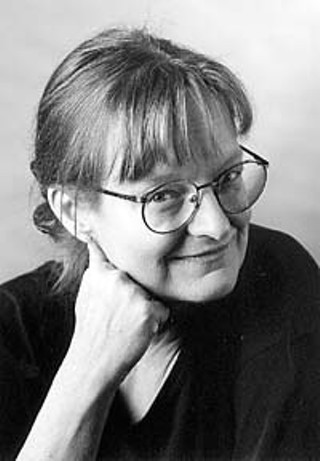Making Gestures
Meeting Michener Center Poet Heather McHugh in False Time
By Lissa Richardson, Fri., May 4, 2001

When I approached poet Heather McHugh for an interview, I had to leap into the future of electronic interaction. She said she was too busy to meet face-to-face, but if I e-mailed her my questions, she'd be happy to answer them. This threatened my tried-and-true methods of reporting. No phone pressed to my ear for an hour as I scribbled answers on a notepad? No recorder on a coffee-stained table top in a South Austin dive? How would I respond to her answers? How would I interact with her responses and know what to ask to get to the bottom of things? The bottom of what? The bottom of being an immensely successful poet, one who has a career spanning almost 25 years, one who has written a dozen books of poetry, essays, and translations, and one who has been a Visiting Writer at UT's Michener Center this spring.
Could she be shy? I wondered. I only know her through her poems, which are bold, sometimes even brash, but the written word can be a way for shy people to write things they won't say out loud. I agreed to the e-mail interview, but with this conventional format: We had to sit at our keyboards and send e-mails to each other in a mimicry of real-time conversation. I kept in the back of my mind that, if the interview was too contrived or somehow unsuccessful, I could ransack her by telephone later.
McHugh is not shy, I learned. Nor were her e-mail answers contrived. Nor did my requested format mimic a real conversation. We responded in counterpoint, in some limping forward motion where I read her answers and shot new questions which, on her end, must have seemed generated from an illogical mind. I think one of my questions went altogether unanswered. I think she thought I asked something that I didn't.
Because "interview" comes from the French entrevue, from s'entrevoir, "seeing between each other," and we couldn't see each other, could we even call this an interview?

"Sure," McHugh responded. "Because 'I see' also means 'I understand.'"
McHugh is a technologically advanced poet. She has her own Web page (www.spondee.com) on which, in addition to some hysterical quotes and anagrams that delight her, she has an "epoem" that she wrote and arranged herself. What's the difference between an "epoem" and a regular poem? Well, this one moves, and as it moves, the meaning (or experience of the meaning) of the words changes. McHugh is pleased that "you need the scroll function for that poem to work. Isn't it a kick that scrolls and icons are back??? I love the lingo."
McHugh notes that she's "unusually interested in the new media for poetry -- I know that many poets are stubborn Luddites, refusing even to use e-mail. ... When electronic instruments were first being explored by musicians, the LEAST interesting uses of them were the attempts to replicate existing instruments -- you know, the electronic gadget that tries to sound like a violin. ... A perfectly good violin already exists."
When I read this, I felt a little embarrassed about my insistence to conduct an e-mail interview in false conversational time. Because of the medium, though, she couldn't see me blush. Computer technology does challenge our writing traditions, especially for poetry. McHugh hints that "relationships between the page and the electronic field" have already changed because of technology: "The page was a kind of arbitrary field for poets, anyway -- I found that out when I was about to buy my first computer and I discovered how obsessed I was with finding an 8-and-a-half-by-11 monitor. I suddenly realized that I had become completely addicted to the purely arbitrary convention of the dimensions of typing paper."
She does not, however, believe that books are passé or that literacy is threatened by technology: "That there is bad reading in abundance is no different from before."

McHugh is steeped in the world of poets. Her translations of Paul Celan, Blaga Dimitrova, and Jean Follain show her knowledge of international poetry. Her essays, and sometimes her poems, examine Rilke, Dickinson, the ancient Greeks, and more. She collaborated with the master of fragmentation, Tom Phillips, to create verse and collage "portraits." She judges contests, reading thousands of poems, and has edited an upcoming edition of Ploughshares, which "will be full of poems by not-yet-very-known young poets -- the kind that can keep things zinging." Michener Center student and poet Phillip Pardi comments that "what's great about Heather is the sheer volume of poems and poets with which she is familiar. That, and her willingness to share it all. ... I felt like I was apprenticing with someone who not only knew her craft inside and out, she also knew the countless trails blazed by other practitioners."
When I met McHugh at her public reading on April 19 at the Harry Ransom Center, I learned that she is as friendly and quick in person as she is online. She is slim and energetic and looks younger than her 52 years. This shows a benefit about meeting in person over talking online. Online, she claimed: "Judging by how tired I'm getting at this stage in my airborne life (I'm 52 and feeling it), I won't be the one to make any mark in the history of ideas." In person, McHugh has a way of lifting her hands in the air when she laughs, as if to say that we don't have to take her words seriously, unless we want to. Online, I missed the gesture. At the reading, I got to enjoy the physical irony: Of course we want to.
McHugh reads well. She read from a number of poems from her 1999 book The Father of the Predicaments and treated us to a reading of poems by Blaga Dimitrova that McHugh and her husband, Nikolai Popov, have translated from Bulgarian. She read in English, and Popov joined her to read the original Bulgarian poems. When Popov left the podium, she ran after him and patted him on the behind, quipping that she felt just like George Bush at the inauguration. The evening was full of lowbrow and highbrow humor, as she laughed, among other things, at herself, at Picasso, and at the fun she has had visiting Texas.
McHugh is a Northerner at heart. Born in Canada and still maintaining dual citizenship, she lives in Washington state and Maine, "literally overlooking the Canadian border whenever I'm in either of my annual stretches, West or East." Her visiting professorship was her first visit to Texas. But she felt drawn here because she has been curious about Austin. McHugh sees herself as "country by nature and inclination," and she loves the music scene that she has found here. When she writes about the music, her language gets sassy: "'You can have my husband but please don't you mess with my man' is my kind of cheek," McHugh says. "And cheek's my favorite part of a Texas anatomy."
McHugh's reading was like a farewell to her students and colleagues at the university. She calls the Michener Center "a really dreamy place to visit." Pardi asserts the benefits of learning from McHugh this semester: "There's no doubt that I've learned how to write better poems from Heather, but equally important has been what I've learned from the way she approaches poetry. ... Someone told me recently that the root of the word 'attention' is the verb 'to care for,' and that feels particularly apt in Heather's case. Even when the intent is critical ... it always feels like the poem is being well cared for."
In addition to her visiting professorship, McHugh has taught for years at the University of Washington and the MFA program at Warren Wilson College. She has honed a direct teaching philosophy: "Advice to students: know when to shut up. Writing poetry isn't the be-all and end-all. It may not even wind up being an at-all, for most of us." McHugh speaks from personal experience: "I once didn't write for five years. It was during a very troubled relationship, the first stretch in my life, since the age of five or so, I hadn't written something EVERY DAY. But in retrospect the reason became plain: something was telling me not to write out of weakness or foolishness or mere habit. Habit is the enemy of art. Never write because you should. Unless you can help it, you shouldn't." This is evidence of the critical caring Pardi suggests.
When I met McHugh after her reading, she thanked me for working with her eccentricities. By "eccentricities" she meant her penchant for e-mail conversation and her preference for an e-mail interview. Her thanks seemed odd, as I had grown accustomed to the format and felt like her e-mail voice was as personal as her face-to-face voice. Perhaps she had helped to change me, too, although -- note to other writers -- I am unwilling to give up traditional interviewing. I must add, though, that I think she said eccentricities. It might have been "idiosyncracies." I can't remember -- it was a face-to-face meeting, and I didn't write it down. ![]()







